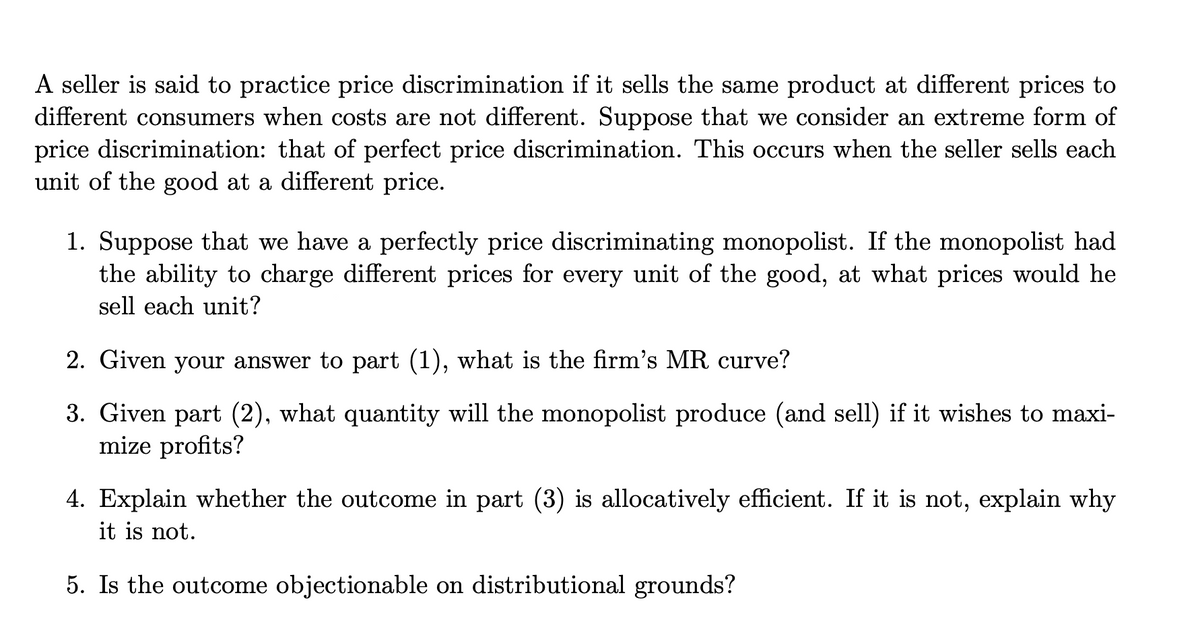A seller is said to practice price discrimination if it sells the same product at different prices to different consumers when costs are not different. Suppose that we consider an extreme form of price discrimination: that of perfect price discrimination. This occurs when the seller sells each unit of the good at a different price. 1. Suppose that we have a perfectly price discriminating monopolist. If the monopolist had the ability to charge different prices for every unit of the good, at what prices would he sell each unit? 2. Given your answer to part (1), what is the firm's MR curve? 3. Given part (2), what quantity will the monopolist produce (and sell) if it wishes to maxi- mize profits?
A seller is said to practice price discrimination if it sells the same product at different prices to different consumers when costs are not different. Suppose that we consider an extreme form of price discrimination: that of perfect price discrimination. This occurs when the seller sells each unit of the good at a different price. 1. Suppose that we have a perfectly price discriminating monopolist. If the monopolist had the ability to charge different prices for every unit of the good, at what prices would he sell each unit? 2. Given your answer to part (1), what is the firm's MR curve? 3. Given part (2), what quantity will the monopolist produce (and sell) if it wishes to maxi- mize profits?
Chapter14: Monopoly
Section: Chapter Questions
Problem 14.2P
Related questions
Question

Transcribed Image Text:A seller is said to practice price discrimination if it sells the same product at different prices to
different consumers when costs are not different. Suppose that we consider an extreme form of
price discrimination: that of perfect price discrimination. This occurs when the seller sells each
unit of the good at a different price.
1. Suppose that we have a perfectly price discriminating monopolist. If the monopolist had
the ability to charge different prices for every unit of the good, at what prices would he
sell each unit?
2. Given your answer to part (1), what is the firm's MR curve?
3. Given part (2), what quantity will the monopolist produce (and sell) if it wishes to maxi-
mize profits?
4. Explain whether the outcome in part (3) is allocatively efficient. If it is not, explain why
it is not.
5. Is the outcome objectionable on distributional grounds?
Expert Solution
This question has been solved!
Explore an expertly crafted, step-by-step solution for a thorough understanding of key concepts.
This is a popular solution!
Trending now
This is a popular solution!
Step by step
Solved in 2 steps

Knowledge Booster
Learn more about
Need a deep-dive on the concept behind this application? Look no further. Learn more about this topic, economics and related others by exploring similar questions and additional content below.Recommended textbooks for you


Principles of Economics (MindTap Course List)
Economics
ISBN:
9781305585126
Author:
N. Gregory Mankiw
Publisher:
Cengage Learning

Essentials of Economics (MindTap Course List)
Economics
ISBN:
9781337091992
Author:
N. Gregory Mankiw
Publisher:
Cengage Learning


Principles of Economics (MindTap Course List)
Economics
ISBN:
9781305585126
Author:
N. Gregory Mankiw
Publisher:
Cengage Learning

Essentials of Economics (MindTap Course List)
Economics
ISBN:
9781337091992
Author:
N. Gregory Mankiw
Publisher:
Cengage Learning

Principles of Microeconomics (MindTap Course List)
Economics
ISBN:
9781305971493
Author:
N. Gregory Mankiw
Publisher:
Cengage Learning

Principles of Economics, 7th Edition (MindTap Cou…
Economics
ISBN:
9781285165875
Author:
N. Gregory Mankiw
Publisher:
Cengage Learning

Managerial Economics: Applications, Strategies an…
Economics
ISBN:
9781305506381
Author:
James R. McGuigan, R. Charles Moyer, Frederick H.deB. Harris
Publisher:
Cengage Learning